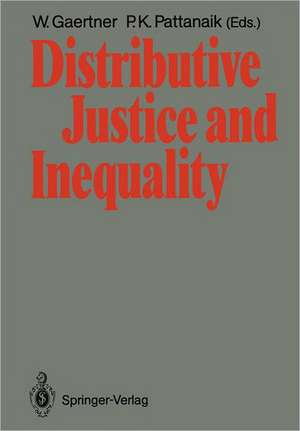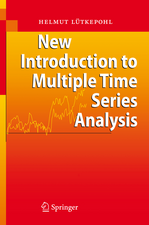Distributive Justice and Inequality: A Selection of Papers Given at a Conference, Berlin, May 1986
Editat de Wulf Gaertner, Prasanta K. Pattanaiken Limba Engleză Paperback – 26 dec 2011
Preț: 636.30 lei
Preț vechi: 748.59 lei
-15% Nou
Puncte Express: 954
Preț estimativ în valută:
121.75€ • 127.13$ • 100.54£
121.75€ • 127.13$ • 100.54£
Carte tipărită la comandă
Livrare economică 15-29 aprilie
Preluare comenzi: 021 569.72.76
Specificații
ISBN-13: 9783642738180
ISBN-10: 3642738184
Pagini: 184
Ilustrații: VIII, 171 p. 1 illus.
Dimensiuni: 170 x 244 x 10 mm
Greutate: 0.3 kg
Ediția:Softcover reprint of the original 1st ed. 1988
Editura: Springer Berlin, Heidelberg
Colecția Springer
Locul publicării:Berlin, Heidelberg, Germany
ISBN-10: 3642738184
Pagini: 184
Ilustrații: VIII, 171 p. 1 illus.
Dimensiuni: 170 x 244 x 10 mm
Greutate: 0.3 kg
Ediția:Softcover reprint of the original 1st ed. 1988
Editura: Springer Berlin, Heidelberg
Colecția Springer
Locul publicării:Berlin, Heidelberg, Germany
Public țintă
ResearchDescriere
From May 20 to May 24, 1986 a conference on distributive justice and in equality was held at the Institute for Advanced Study Berlin (Wis senschaftskolleg zu Berlin). More than thirty scholars participated in this conference. The topics of the presentations ranged from ethics, welfare economics and social choice theory to characterizations of inequality meas ures and redistributive taxation schemes. This book contains a selection of the papers given at the conference. This collection of articles also appeared as issues 2 and 3 of volume 5 of Social Choice and Welfare. In the first paper P. Suppes argues for a pluralistic concept of equity. For too long the emphasis has been on income distribution but there are other characteristics which are important when one talks about equity. Suppes suggests that it would be desirable to have Lorenz curves for a variety of fea tures of societies, such as education, health and housing. P. Dasgupta studies the quality of lives in terms of an index of living stand ards. One has to distinguish between "same number choices" (the number of lives is given) and "different numbers choices" (problem of optimum popUlation). The author argues that in the latter case the anonymity (or sym metry) axiom cannot be readily defended. Once it is dropped, however, an incoherence in the moral ordering of possible worlds arises. The moral basis for different numbers choices becomes generation-dependent, an overall moral ordering of possible worlds no longer exists.
Cuprins
Lorenz Curves for Various Processes: A Pluralistic Approach to Equity.- Lives and Well-Being.- Consequentialist Demographic Norms and Parenting Rights.- Measurement of Inequality: An Attempt at Unification and Generalization.- On a Class of Inequality Measures.- Poverty Orderings and Welfare Dominance.- Income Inequality, Welfare and Poverty in a Developing Economy with Applications to Sri Lanka.- Distributional Implications of Equal Sacrifice Rules.- A Note on Minimally Progressive Taxation and Absolute Income Inequality.- Progressive Taxation and Redistributive Taxation: Different Labels for the Same Product?.- Characterizing the Nash Bargaining Solution without Pareto-Optimality.















